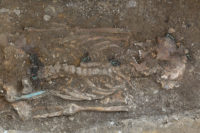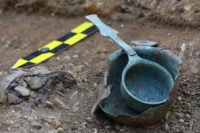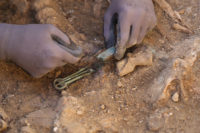 The richly furnished grave of a man from the early 2nd century A.D. has been unearthed in the town of Uherský Brod, in the southeastern Czech Republic. It is the richest Roman-era grave ever found in Moravia.
The richly furnished grave of a man from the early 2nd century A.D. has been unearthed in the town of Uherský Brod, in the southeastern Czech Republic. It is the richest Roman-era grave ever found in Moravia.
The burial was discovered by accident during sewer works, unfortunately as a result of it having been damaged by heavy machinery. A sharp-eyed worker spotted a bronze object amidst the soil in the bucket of his excavator and reported it to the archeological department of the Moravian-Silesian Museum in Uherské Hradiště. Construction work was halted as archaeologists examined the piece and the disturbed soil where it had been dredged up by the digger. The artifact was identified as a bronze pan, and a matching bronze ladle was found in the soil.
 A full salvage excavation ensued. The team unearthed the source of the bronze set: the grave of a wealthy man, almost certainly a warlord. There were bronze spurs at his feet and four bronze buckles fastened his robe (long-since decayed). The larger bronze buckle from his belt was found at his waist, as were a bronze knife with a decorated handle and a bone brooch.
A full salvage excavation ensued. The team unearthed the source of the bronze set: the grave of a wealthy man, almost certainly a warlord. There were bronze spurs at his feet and four bronze buckles fastened his robe (long-since decayed). The larger bronze buckle from his belt was found at his waist, as were a bronze knife with a decorated handle and a bone brooch.
The area of the grave that had been damaged by the mechanical digger also contained grave goods. In the area above the deceased’s head was a broken ceramic vessel. The bronze pot and ladle were stored inside of it before their brusque removal.
 These grave goods were not locally made. They were expensive imports from the Roman Empire, which suggests the man was someone of rank, wealth and importance. They are rich enough to indicate he may have been regionally important, a chieftain or warlord.
These grave goods were not locally made. They were expensive imports from the Roman Empire, which suggests the man was someone of rank, wealth and importance. They are rich enough to indicate he may have been regionally important, a chieftain or warlord.
At the time of this burial, Moravia was occupied by the Germanic Quadi people who, according to Tacitus, had a monarchical system and were ruled by a kings from the ranks of their own nobility. The Quadi were subdued around 18 A.D. by the armies of Tiberius Caesar commanded by his nephew Germanicus. After that, their rulers were client kings of Rome.
The Marcomanni and Quadi have, up to our time, been ruled by kings of their own nation, descended from the noble stock of Maroboduus and Tudrus. They now submit even to foreigners; but the strength and power of the monarch depend on Roman influence. He is occasionally supported by our arms, more frequently by our money, and his authority is none the less.
The newly discovered grave attests to the spread of Roman cash and luxury goods even beyond the formal boundaries of the empire.